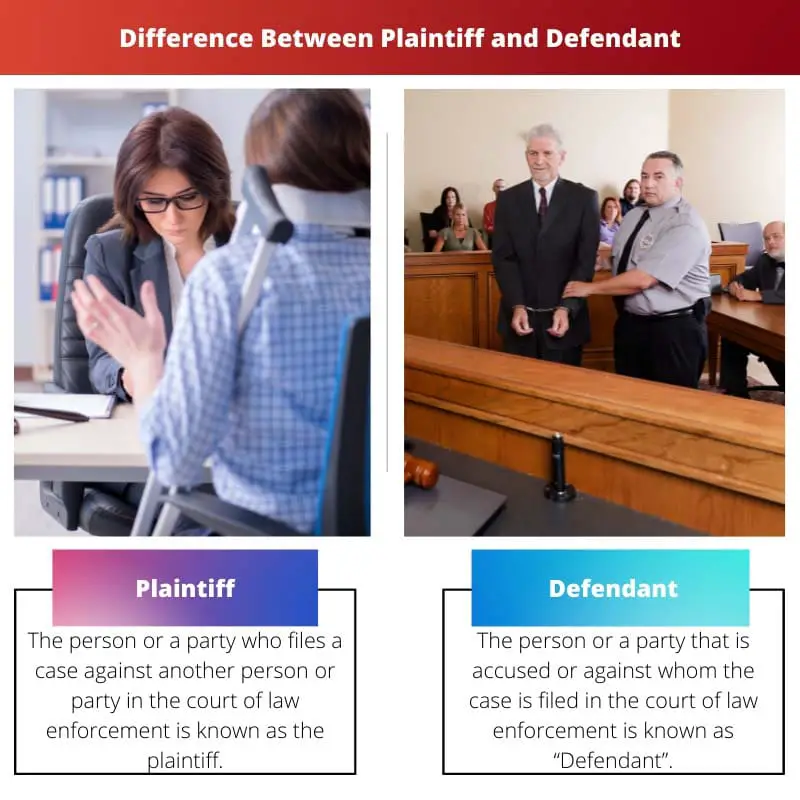There exist several terms that have different meanings in various areas. These terms help us to understand more about the specified notion.
It also entails several procedures and the people that are involved in these procedures. However, the two primary terms that are used are 1. Plaintiff and 2. Defendant.
Key Takeaways
- A plaintiff is a person who initiates legal action or files a lawsuit, while a defendant is a person against whom the legal action is brought or who is being sued.
- Plaintiff is responsible for proving their case and presenting evidence, while the defendant can either refute the plaintiff’s claims or present their evidence to defend themselves.
- Plaintiff is also responsible for initiating the legal proceedings and paying the associated costs, while the defendant only incurs costs if they lose the case.
Plaintiff vs Defendant
Plaintiff is the person or party who initiates a lawsuit or a legal action against a third part, seeking legal redress for a perceived injury. Defendant is the person or party against whom a legal action or lawsuit has been filed. The defendant is required to respond to the plaintiff’s claims.

The person or a party who files a case against another person or party in the court of law enforcement is known as the plaintiff.
The person or a party that is accused or against whom the case is filed in the court of law enforcement is known as the “Defendant.” The diction of the term differs from one jurisdiction to another.
Comparison Table
| Parameters of Comparison | Plaintiff | Defendant |
|---|---|---|
| Meaning/ Definition | The person or a party who files a case against another person or party in the court of law enforcement is known as the plaintiff. | The person or a party that is accused or against whom the case is filed in the court of law enforcement is known as “Defendant”. |
| Procedure | The plaintiff files a case against the defendant in the court of law enforcement. | The defendant is accused of a crime, and a case is filed against the defendant in the court of law enforcement. |
| First Use | 14th century | In the 14th century, as a noun as well as an adjective. |
| Synonyms | Complainant, prosecutor, suer, accuser, suitor, pleader, petitioner. | Litigant, offender, suspect, prisoner, accused, arrestee, detainee, lawbreaker, criminal, perpetrator, wrongdoer, misdoer. |
| Antonyms | Defendant, accused, arrestee, detainee, criminal, perpetrator, lawbreaker, felon, convict. | Gangbuster, lawman, plaintiff, accuser, suitor, pleader, prosecutor. |
What is Plaintiff?
The person or a party who files a case against another person or party in the court of law enforcement is known as the plaintiff.
However, the roots of the word “plaintiff” can be found in the year 1278. It was derived from an Anglo-French word called “plaintiff.”
The term “Plaintiff” has been in use in several English-speaking jurisdictions. However, in England and Wales, the term is known as “claimant,” which also has multiple meanings and definitions.
Several synonyms and near-synonyms of the term “Plaintiff” include complainant, prosecutor, suer, accuser, suitor, pleader, petitioner, pleader, indicter, confronter, claimer, challenger, applicant, litigator, beseecher, pursuer, solicitor, etc.
What is Defendant?
The person or a party that is accused or against whom the case is filed in the court of law enforcement is known as the “Defendant.”
The defendants are brought under police custody, and only after that, they are put in front of the court of law under an arrest warrant.
In various parts of the world, the term has different meanings, definitions, and usage, as well as a matter of fact. In Scots law, during criminal proceedings, the terms like “accused” and “panel” are majorly used.
Several synonyms for the term “Defendant” include litigant, offender, suspect, prisoner, accused, arrestee, detainee, lawbreaker, criminal, perpetrator, wrongdoer, misdoer, etc.

Main Differences Between Plaintiff and Defendant
- The synonyms for the term “plaintiff” include prosecutor, suer, accuser, suitors, etc., on the other hand, the synonyms for the term “defendant” include accused, arrestee, detainee, criminal, perpetrator, etc.
- The antonyms for the term “plaintiff” include accused, defendant, arrestee, detainee, criminal, perpetrator, lawbreakers, etc.

- https://www.journals.uchicago.edu/doi/abs/10.1086/467986
- https://psycnet.apa.org/record/1988-07436-001

The post provides a comprehensive understanding of ‘plaintiff’ and ‘defendant’, with clear examples and detailed explanations.
Yes, the post presents the information logically, aiding in the understanding of these legal terms.
I agree, the inclusion of synonyms and antonyms was beneficial for contextualizing ‘plaintiff’ and ‘defendant’.
The post is well-structured and informative, providing a comprehensive understanding of ‘plaintiff’ and ‘defendant’.
The distinction between ‘plaintiff’ and ‘defendant’ is clearly outlined. The historical origin of both terms is an interesting addition to the post.
I agree with you. They have also provided good references for further reading on this topic.
The detailed explanations and the comparison table were helpful in understanding the nuances of ‘plaintiff’ and ‘defendant’.
Absolutely, the post does an excellent job of providing clarity on these legal terms.
The explanations provided for both ‘plaintiff’ and ‘defendant’ are coherent and easy to follow, making it accessible to a wide audience.
I agree, the post avoids using overly complex legal jargon, making it more understandable for readers.
The historical background and different meanings of ‘plaintiff’ and ‘defendant’ were enlightening. The post provides valuable insights into these legal terms.
I agree, the detailed comparisons and historical origins added depth to the post, making it informative and engaging.
The post enriches the understanding of ‘plaintiff’ and ‘defendant’ with detailed and well-structured explanations.
The comparison table provided a clear overview of the meanings and definitions of ‘plaintiff’ and ‘defendant’.
Yes, especially the historical background of these terms provides context to their meanings.
The thorough explanation makes it easier to understand the meanings of ‘plaintiff’ and ‘defendant’. The references provided are helpful for anyone wanting to explore this topic in more depth.
The post’s comparison table was particularly insightful, giving a detailed look at the parameters of comparison between ‘plaintiff’ and ‘defendant’.
I agree with you. The post is a great resource for anyone interested in law terminology.
Your post has provided a clear and comprehensive definition of these legal terms. It was interesting to see the synonyms and antonyms for ‘plaintiff’ and ‘defendant’.
I completely agree with you. The post also describes the main differences between ‘plaintiff’ and ‘defendant’.
The thorough explanation of the terms, along with the comparison table, was particularly useful. The use of synonyms and antonyms enriched the understanding of ‘plaintiff’ and ‘defendant’.
I concur. The explanations have provided valuable insights into the legal meanings of these terms.